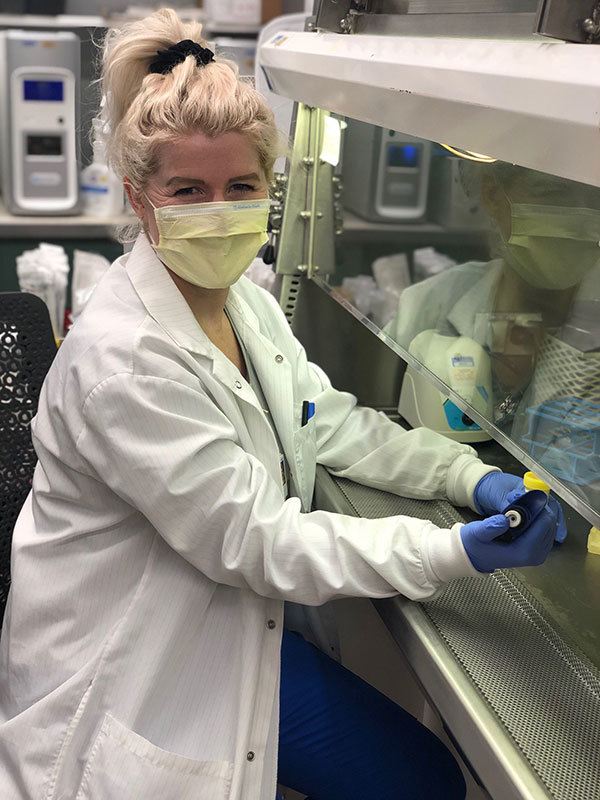Frontline Falcons play critical role in medical testing
 COVID-19 Shines Light on the Importance of Medical Laboratory Testing
COVID-19 Shines Light on the Importance of Medical Laboratory Testing
By Colleen Rerucha '06
Emily Barnes-Hanna '07 is a Frontline Falcon, playing a critical role in patient care at a local hospital. But if you don’t catch a glimpse of her coming or going, you may not see her again during her shift.
As a medical laboratory scientist, she works deep in a hospital laboratory analyzing patients' test results. It’s part of the health care industry most will never see.
“It’s a hidden profession, but it’s really important,” Barnes-Hanna said. “Seventy percent of medical decisions are based on laboratory results.”
Because of the COVID-19 pandemic, medical testing has shifted from a behind-the-scenes role to center stage.
“It shines a light on what we do and the importance of lab testing,” she said. “This is a really interesting time for science and epidemiological studies, especially being able to see it firsthand.”
Barnes-Hanna has been working long hours as her hospital system goes through the validation process for testing for COVID-19.
“It’s been a roller coaster,” she said. “We’ve been working really hard to get it up and running for the community.”
Barnes-Hanna is a 2007 graduate of BGSU’s medical laboratory science program in the College of Health and Human Services. She was initially unsure of what she wanted to major in, but decided to pursue medical laboratory science after learning more about BGSU’s program, which is accredited by the National Accrediting Agency for Clinical Laboratory Science (NAACLS) and has a 100 percent job placement rate for BGSU graduates.
“I really didn’t know there was a specialized major for it,” she said. “I’ve never looked back since.”
BGSU graduates comprise the majority of medical laboratory scientists in northwest Ohio.
“Our graduates work in laboratories everywhere, predominantly in the hospital setting,” said Dr. Mary-Jon Ludy, interim chair of the Department of Public and Allied Health at BGSU. “Other roles include quality assurance and process improvement, laboratory information systems, infection control, health care administration, sales and education.”
Faculty in the medical laboratory sciences program work closely with employers and guarantee a clinical practicum, or internship, for students at sites in hospital-based medical laboratories.
“Employers love our graduates,” Ludy said. “They consistently say that our graduates are well-prepared with strong entry-level skills.”
Barnes-Hanna returned to BGSU to earn her master’s degree in gerontology in 2018. In addition to her work as a medical laboratory scientist, she is also an assistant clinical professor and laboratory and education coordinator at BGSU.
“I went back to education because I love my profession,” she said. “I try to advocate for this field because it is so important for the health care industry, now more than ever.”
Updated: 04/24/2020 10:42AM
